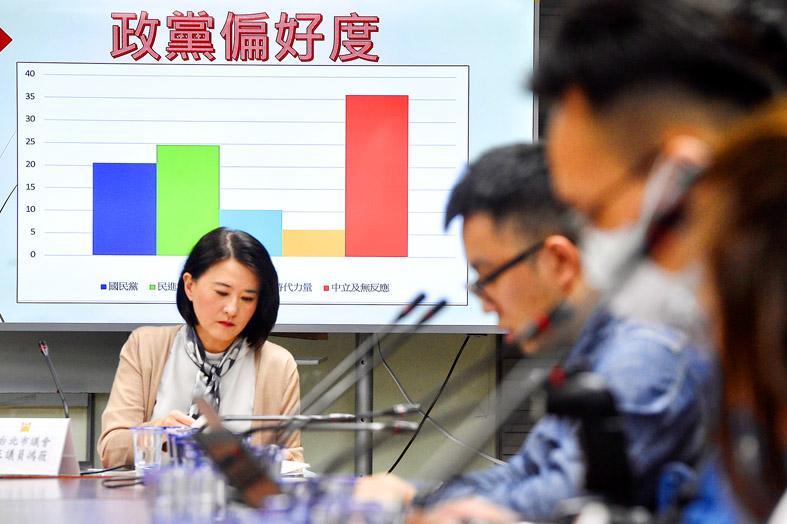More than 70 percent of the public disagrees that Taiwan should allow imports of US pork containing ractopamine residue, even though this might entail further US support, a survey released yesterday by the Chinese Nationalist Party (KMT)- affiliated National Policy Foundation found.
The survey, which was conducted from Tuesday to Thursday last week, asked members of the public whether they agreed with the statement: “In order for the US to support Taiwan more, we should allow imports of US pork containing leanness-enhancing agents.”
It found that 72.3 percent of respondents disagreed with the statement, while 20.3 agreed, the foundation said.

Photo: George Tsorng, Taipei Times
Asking whether people supported the import of the US pork regardless of its effect on Taiwan-US ties, the survey found that 70.6 percent of respondents disagreed, while 22.8 percent agreed.
A survey last month found that 65.9 percent of respondents opposed imports of pork containing ractopamine, KMT Legislator Hsieh Yi-fong (謝衣鳳) told a news conference in Taipei.
The more Taiwanese understood the issue and the closer it gets to the lifting of the import ban on Jan.1, the more they oppose the policy, Hsieh said, urging the government to “respect public opinion.”
Polls conducted by the Taiwanese Public Opinion Foundation this month and last month also showed an increase of about 5 percent in the opposition to allowing the imports, KMT Taipei City Councilor Wang Hung-wei (王鴻薇) said.
This month’s foundation survey also found that 20.9 percent of people said that Beijing would “bully Taiwan even more” after US president-elect Joe Biden takes office on Jan. 20.
However, 61.6 percent of respondents disagreed, and 17.5 percent of respondents gave “no response,” the survey found.
It also showed that 19.3 percent of respondents agreed with a statement that the Democratic Progressive Party (DPP) administration might be able to “negotiate a better consensus than the ‘1992 consensus,’” with Beijing, while 58.9 percent disagreed, and 21.8 percent gave “no response.”
The “1992 consensus,” a term former Mainland Affairs Council chairman Su Chi (蘇起) admitted making up in 2000, refers to a tacit understanding between the KMT and the Chinese Communist Party (CCP) that both sides acknowledge there is “one China,” with each side having its own interpretation of what “China” means.
The survey also showed that 90.8 percent of respondents were against abolishing the death penalty, compared with 4.7 percent who were in favor of abolishing it.
Asked which political party they supported, 24.7 percent of people said that they favored the DPP, and 20.6 percent said they supported the KMT, the survey showed.
Another 10.4 percent said that they favored the Taiwan People’s Party, 6 percent said they supported the New Power Party, and 1.5 percent said they supported the Taiwan Statebuilding Party, it found.
A total of 36.1 percent of respondents either said they were neutral or had “no response” to party preference, the survey showed.
The gap in support for the KMT and the DPP is closing, foundation vice president Huang Hsin-hua (黃心華) said, adding that the gap was 4.1 percentage points, while the poll last month recorded a gap of 6.3 percentage points.
The survey results were based on telephone interviews with 1,078 people aged 20 or older, the foundation said.
The survey was conducted by Taiwan Real Survey and had margin of error of 2.98 percentage points, it added.

A decision to describe a Chinese Ministry of Foreign Affairs statement on Singapore’s Taiwan policy as “erroneous” was made because the city-state has its own “one China policy” and has not followed Beijing’s “one China principle,” Deputy Minister of Foreign Affairs Tien Chung-kwang (田中光) said yesterday. It has been a longstanding practice for the People’s Republic of China (PRC) to speak on other countries’ behalf concerning Taiwan, Tien said. The latest example was a statement issued by the PRC after a meeting between Singaporean Prime Minister Lawrence Wong (黃循財) and Chinese President Xi Jinping (習近平) on the sidelines of the APEC summit

Taiwan’s passport ranked 34th in the world, with access to 141 visa-free destinations, according to the latest update to the Henley Passport Index released today. The index put together by Henley & Partners ranks 199 passports globally based on the number of destinations holders can access without a visa out of 227, and is updated monthly. The 141 visa-free destinations for Taiwanese passport holders are a slight decrease from last year, when holders had access to 145 destinations. Botswana and Columbia are among the countries that have recently ended visa-free status for Taiwanese after “bowing to pressure from the Chinese government,” the Ministry

HEALTHCARE: Following a 2022 Constitutional Court ruling, Taiwanese traveling overseas for six months would no longer be able to suspend their insurance Measures allowing people to suspend National Health Insurance (NHI) services if they plan to leave the country for six months would be abolished starting Dec. 23, NHIA Director-General Shih Chung-liang (石崇良) said yesterday. The decision followed the Constitutional Court’s ruling in 2022 that the regulation was unconstitutional and that it would invalidate the regulation automatically unless the NHIA amended it to conform with the Constitution. The agency would amend the regulations to remove the articles and sections that allow the suspension of NHI services, and also introduce provisional clauses for those who suspended their NHI services before Dec. 23, Shih said. According to

Minister of Labor Ho Pei-shan (何佩珊) yesterday apologized after the suicide of a civil servant earlier this month and announced that a supervisor accused of workplace bullying would be demoted. On Nov. 4, a 39-year-old information analyst at the Workforce Development Agency’s (WDA) northern branch, which covers greater Taipei and Keelung, as well as Yilan, Lienchiang and Kinmen counties, was found dead in their office. WDA northern branch director Hsieh Yi-jung (謝宜容), who has been accused of involvement in workplace bullying, would be demoted to a nonsupervisory position, Ho told a news conference in Taipei. WDA Director-General Tsai Meng-liang (蔡孟良) said he would